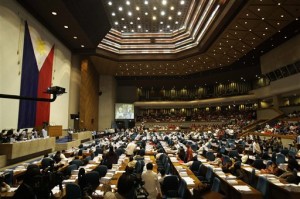MANILA, Philippines—Pending bills seeking to curb monopolies and unfair competition in business got a boost from various government agencies and business groups, which said that such measures were long overdue and needed in the light of the impending economic integration of countries in Southeast Asia by 2015.
The House committees on economic affairs and trade and industry have begun deliberations on the various antitrust bills that have been filed in the 16th Congress, and there appears to be little resistance to the measures that are intended to encourage free and fair economic competition.
The antitrust bills seek to prohibit the abuse of market-dominant positions and the excessive concentration of economic power by regulating unfair business practices and improper acts. These are intended to protect consumers and promote a balanced development of the economy.
One of the authors of such a measure is Speaker Feliciano Belmonte, who earlier said he considered the bill a House priority.
Belmonte, in his explanatory note to his bill, said the lack of genuine competition in certain industries impairs the public welfare and undermines the country’s credibility to provide a business climate that would entice investors.
GDP growth
A comprehensive competition policy would also help improve the growth of the gross domestic product (GDP), raise wages and cause prices to drop, he said.
Such measures, though, had been unsuccessful in previous congresses, with trade and industry committee chair Rep. Mark Villar noting that these bills had been filed in various forms since the 8th Congress, but had failed to pass into law.
Economic affairs committee chair Rep. Enrique Cojuangco, for his part, noted that the antitrust bills would help the Philippines cope with the coming Asean economic integration.
Assistant Secretary Geronimo Sy, who heads the Office for Competition under the Department of Justice, said the country’s antitrust laws must be custom fit, especially since these would have an impact on everybody.
Sy noted that there had not been enough focus on economic justice, which is just as important as criminal justice.
“We have not given enough thought and emphasis to economic justice, when the daily wage of the little people is being sucked dry by cartel-like or dominant and abusive behavior,” he said.
Sy added that economic justice was what the antitrust and anticompetition bills seek to bring about.
Also supporting the antitrust measures is the Securities and Exchange Commission, whose chair, Teresa Herbosa, said these would provide a regulatory framework to combat unfair trade practices.
The Philippine Exporters Federation, through its representative Liza Leong, said even exporters were affected by high price and the negative impact of anticompetitive practices, which was why the group would like to have an antitrust law in place.
Independent oversight
But Leong also said the group would recommend that there be no sectoral exemptions under the law. There should also be an independent and separate body, free from political influence and undertones, to oversee the implementation of the measure.
Erlinda Medalla of the Philippine Institute for Development Studies said she was happy a new competition law was being tackled in Congress.
She said such a law was necessary because firms, in their quest for profit, would try to use unfair methods and take advantage of the market.
Anthony Abad of the TA Trade Authority Group said the antitrust bills would level the playing field and also help protect Philippine interests against the threat of foreign players in an integrated market.


